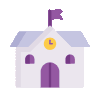The Difference Between Speech and Language Disorders
A speech disorder is when a child is unable to produce speech sounds effectively or correctly; or, when there is a problem with his or her voice. Stuttering would be an example of a speech disorder.
A language disorder is when a child has trouble understanding what is being said to him or her (receptive language) or sharing thoughts and feelings in a complete or coherent manner (expressive language).
While both speech and language disorders can have a significant and negative effects on a child’s ability to learn, they are not, themselves, learning disorders.
Common Types of Speech and Language Disorders
· Stuttering
· Articulation Disorders
· Aphasia
· Apraxia of Speech
· Speech Delay
· Feeding Problems
· Voice disorders
Causes
While there are some medical and developmental conditions that can lead to speech and language disorders, such as ADHD, autism, traumatic brain injury and cleft lip or palate, hearing loss and frequent ear infections, in many cases there is no discernable cause. It is best to consult with a trained and certified speech-language pathologist to identify the possible causes of the disorder that your child has in order to pinpoint the ideal method of treatment for him or her.
Treatment Options
When most people think of treatment of speech and language problems, they think of speech therapy – but this is a very broad concept. Just as there are many different kinds of speech and language disorders, treatment options vary and are oftentimes individualized to address specific the problems caused by the disorder and also the patient’s needs.
Speech-language pathology is the umbrella name given to the treatment of speech and language disorders. In all cases where a speech and language disorder is suspected, the most effective course of action is to contact a speech-language pathologist, a health professional trained to diagnose speech and language problems and also to treat these problems.
When to Seek Treatment
It is best to seek treatment as soon as you suspect there might be a problem with your child’s speech or language development. There are many charts available online (from medically reliable websites) which will describe guidelines for what kinds of speech to expect from your child at a given age. It is widely acknowledged that the earlier treatment is administered for a speech and language disorder, the more complete the child’s recovery tends to be.
Role of Parents in Their Child’s Treatment
While seeking professional help for your child is the first and most important step in treatment, being involved in the treatment process can be just as vital. It is likely that your child will only meet with their speech-language pathologist once or twice a week for formal treatment, which leaves a lot of time in which he or she can forget the lessons learned if they are not being practiced at home. It is helpful to support your child’s speech development through exercises or speech games that will reinforce and augment the work that’s done in therapy. Talk to your speech-language therapist about what you can do with your child at home.












